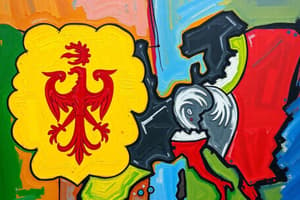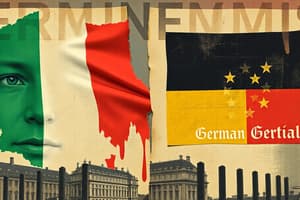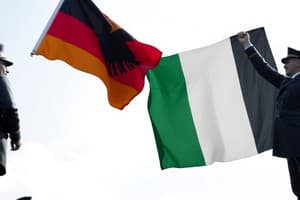Podcast
Questions and Answers
Nationalism encouraged people with a shared identity to?
Nationalism encouraged people with a shared identity to?
separate themselves from those who were unlike them.
What is the most likely reason Bismarck was named chancellor when King Wilhelm I became kaiser of Germany?
What is the most likely reason Bismarck was named chancellor when King Wilhelm I became kaiser of Germany?
Wilhelm wanted to reward Bismarck, who was largely responsible for German unification.
Giuseppe Garibaldi helped the nationalist cause by?
Giuseppe Garibaldi helped the nationalist cause by?
capturing most of southern Italy for the king of Sardinia.
According to nationalists, a nation-state's government should be?
According to nationalists, a nation-state's government should be?
The Kingdom of Italy was created in?
The Kingdom of Italy was created in?
The group Young Italy advocated for?
The group Young Italy advocated for?
According to the map, Italy in the early 19th century was?
According to the map, Italy in the early 19th century was?
How would Germany most likely have been different between 1848 and 1871 if Prussia had not belonged to the German Confederation?
How would Germany most likely have been different between 1848 and 1871 if Prussia had not belonged to the German Confederation?
How was Germany similar to Italy in the 1800s?
How was Germany similar to Italy in the 1800s?
A challenge that Italy faced after unification was?
A challenge that Italy faced after unification was?
Flashcards are hidden until you start studying
Study Notes
Nationalism and Identity
- Nationalism inspired individuals with a common identity to distinguish themselves from those with different backgrounds.
- A nation-state's government, according to nationalists, should reflect the will of its people.
Bismarck and German Unification
- Otto von Bismarck was appointed chancellor by King Wilhelm I to honor his pivotal role in German unification.
- Bismarck's leadership was instrumental in uniting various German states under Prussian dominance.
Italian Nationalism
- Giuseppe Garibaldi was a key figure in the Italian nationalist movement, known for capturing much of southern Italy to unify it under the Sardinian crown.
- Young Italy, a political movement founded by Giuseppe Mazzini, advocated for democratic governance and national unity.
Formation of Italy and Challenges
- The Kingdom of Italy was officially established in 1861, marking a significant achievement in Italian nationalism.
- Post-unification, Italy struggled with political unrest and instability, complicating governance and national cohesion.
Geographic and Historical Context
- In the early 19th century, Italy was fragmented into multiple kingdoms and city-states, impeding national unity.
- Both Germany and Italy experienced revolutionary movements during the 1800s that aimed at national unification.
German Confederation Impact
- Had Prussia not been part of the German Confederation, the process of German unification would have been significantly slower, delaying the creation of a unified nation-state.
Studying That Suits You
Use AI to generate personalized quizzes and flashcards to suit your learning preferences.




